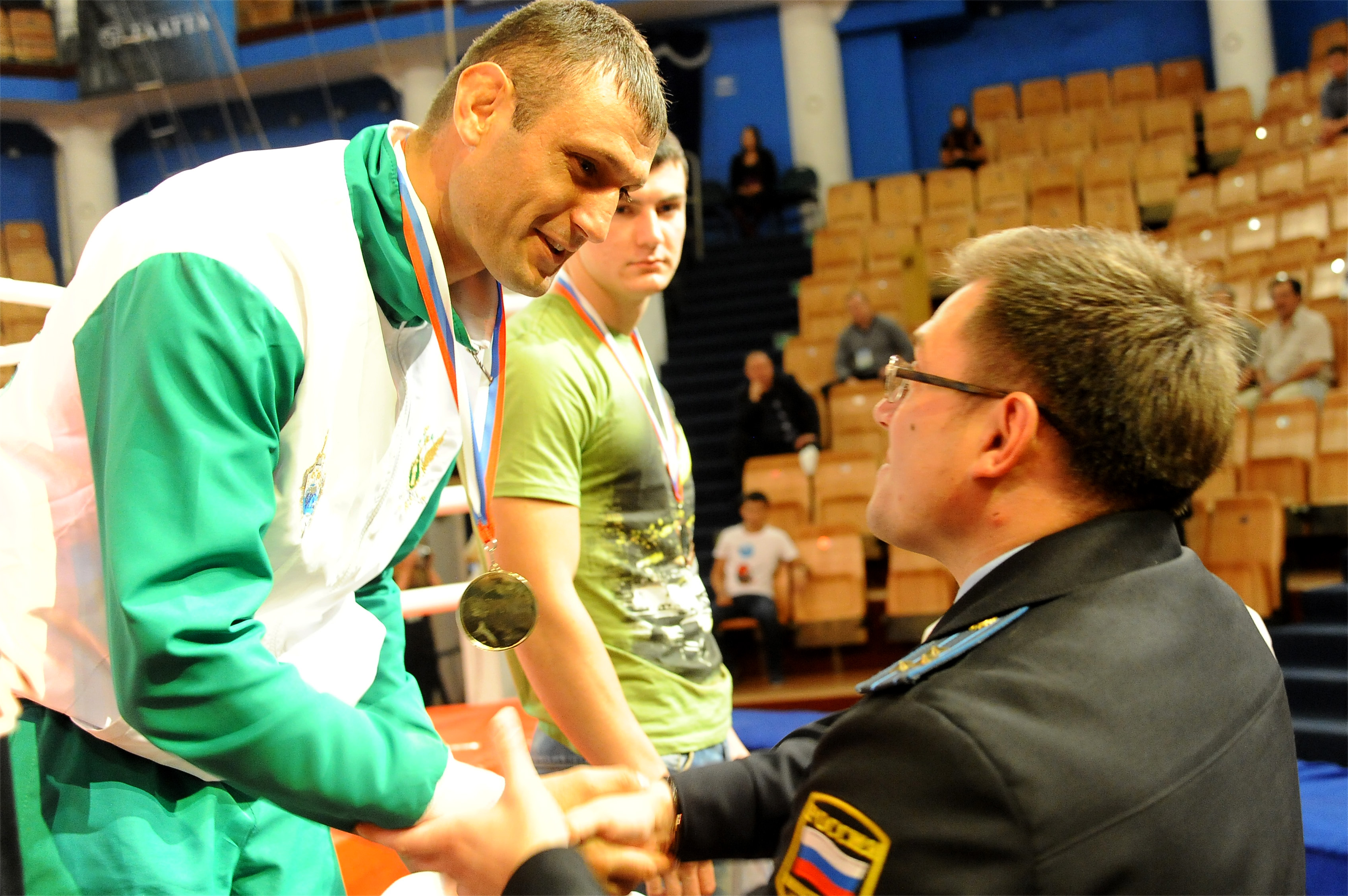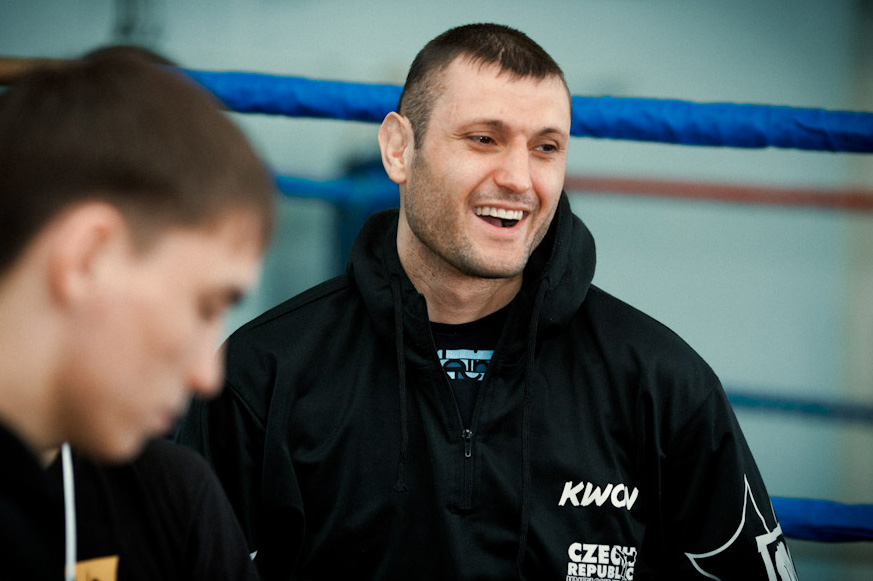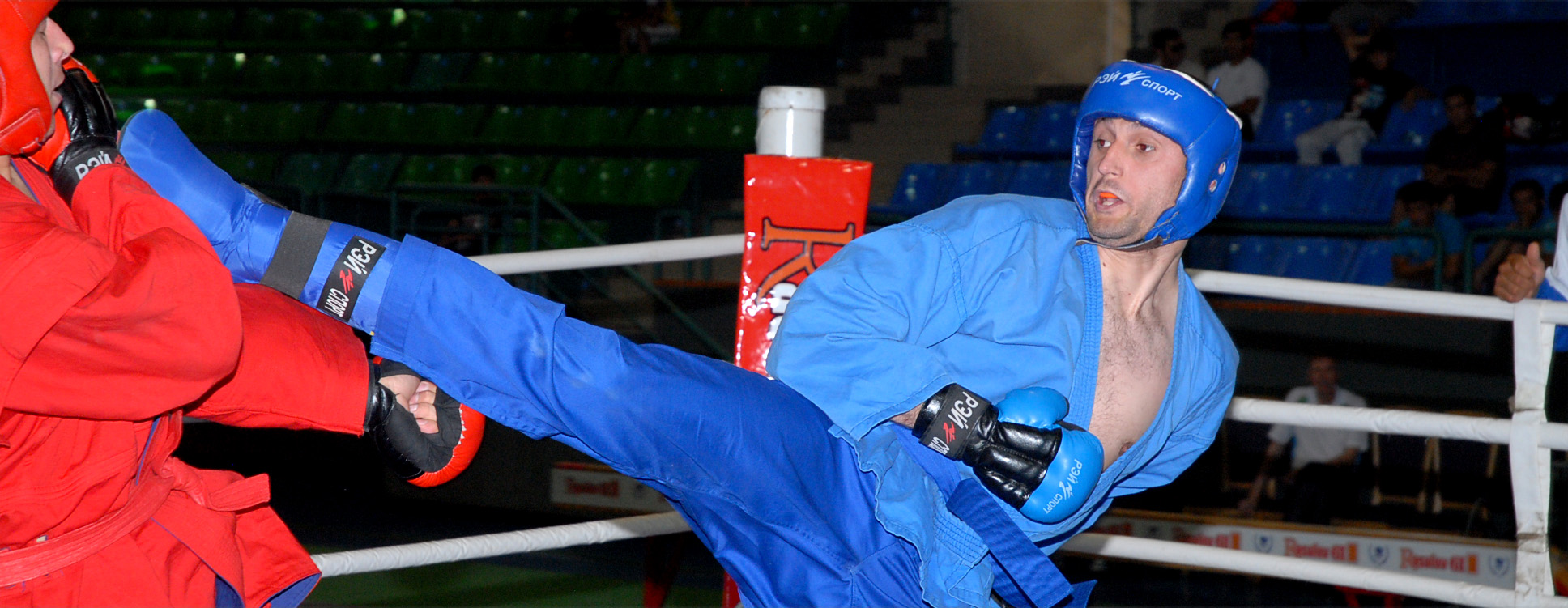 Arthur Odilbekov receives a gold medal. The Tajik Ismaili athlete has competed and won many championships in Russia and internationally, and is working to further promote sport in his home country. Courtesy of Arthur Odilbekov
Arthur Odilbekov receives a gold medal. The Tajik Ismaili athlete has competed and won many championships in Russia and internationally, and is working to further promote sport in his home country. Courtesy of Arthur Odilbekov“I compare my school years with those of my classmates and realise that they spent most of their time partying and I spent most of my life in the gym,” recalls Arthur Odilbekov of his teenage years.
His hard work has paid off. Despite seemingly insurmountable odds, the 29 year-old Ismaili athlete from Tajikistan has forged a successful career in combat sport, including winning the 2012 World Championship in Pankration.
A blend of boxing and wrestling, Pankration is said to have been part of the ancient Greek Olympic Games. It's name is derived from the Greek words “Pan” and “Kratos”, which translates to “the one who controls everything.” Although not part of the modern Olympics, the modern form of the sport is described by the International Federation of Associated Wrestling Styles (FILA) as “a mild form of mixed martial arts (MMA), which forbids striking to the head.”
Interview with Arthur Odilbekov Determination, faith and discipline can lead a person to spectacular heights. Shodmon Hojibekov speaks with martial arts champion Arthur Odilbekov of Tajikistan to find out what drives him.
Determination, faith and discipline can lead a person to spectacular heights. Shodmon Hojibekov speaks with martial arts champion Arthur Odilbekov of Tajikistan to find out what drives him.
more »
Though Tajikistan has some renowned athletes, the country's name does not top the winners list very often. Taekwondo and football are very popular, but while Tajikistan's football teams have not made it to the top matches since the 1980s – when the legendary “Pamir” team defeated one of the best Russian teams of the time – sportsmen representing Tajikistan in the non-Olympic taekwondo have earned many medals. Yet, for most sport is relegated to a hobby rather than a career. Sportsmen do not earn very much in Tajikistan and have to find other jobs to make a living.
“Along with [the country's] independence [in 1992], Tajikistan's sports organisation got the opportunity to create national sports federations, the National Olympic Committee, and to become a member of the International Olympic movement,” says Shirinjon Mamadsafoev, a former Vice President of the NOC. “But this process was somewhat halted due to the interior civil conflict in 1992-1997, social and economic problems, and the migration of high-class professionals from the country.”
Improving the situation is not an easy task, he continues. An Ismaili who is dedicated to the development of sport in Tajikistan, Mamadsafoev previously served as the Vice President of the Tajik National Olympic Committee. He is now the Vice President of the country's Judo Federation. The biggest problem, he says, is a lack of funding.
“We don't have highly competent professional trainers, there is a complete absence of medical and biological research and scientific training methodology, we do not have opportunity to open training camps abroad or participate in many international competitions,” he says.
Since independence, Tajikistan has taken part in five Olympic games. With few sports facilities, its athletes have only managed to bring home two bronze and a silver medal. The last bronze from the 2012 London Olympic Games earned by Mavzuna Chorieva, a female boxer, was not only an achievement for Tajik sport, but also a sensational victory over stereotypes.
“Developing sports among women is more difficult due to the traditional lifestyle and poor training conditions,” notes Mamadsafoev.
When he prepares for competition, Arthur Odilbekov cuts off all communication with friends and even minimises contact with his family. His schedule is tight and training is intense. But this has been the only way for Odilbekov to pursue his dream of making a career out of sport. The 2012 championship was not his first victory, but it is a source of great pride since he was representing his country.
 Arthur Odilbekov, 2012 World Champion in Pankration, competes inside the octagon (the arena of combat). Courtesy of Arthur Odilbekov
Arthur Odilbekov, 2012 World Champion in Pankration, competes inside the octagon (the arena of combat). Courtesy of Arthur OdilbekovBorn into a family of athletes, it was natural for Odilbekov to pursue sport. In his early teens he joined the taekwondo club in Khorog, capital of Tajikistan's Gorno-Badakhshan Autonomous Oblast (GBAO). His studies took him to the Military Institute at the Defense Ministry of the Russian Federation, where he switched to Pankration, as Taekwondo was not an option in the institute's programme.
He has since scored repeated victories in Russian national tournaments in taekwondo, sambo, mixed martial arts, and other types of combat sport. His first big victory took place in 2004, when he won the MMA Championship in Prague, Czech Republic. However, he was representing Russia in that competition, not Tajikistan.
It is not unusual for Tajik athletes to represent another country during their sport career. “Many Tajik sportsmen have dual citizenship, join the Russian clubs of judo, boxing, taekwondo, chess, kickboxing and others and then represent Russia [during contests],” explains Mamadsaofev. “[One of them is Ismaili] boxing professional [Alijah] Rahimkul Malakhbekov, who won the titles of world champion twice, champion of Europe six times, and won two medals [bronze and silver] in Olympic games.”
However, longing to change the situation in his country, Odilbekov decided to represent Tajikistan in the 2012 Pankration World Championship. He has now set his sights on building a sports centre for the development of professional mixed martial arts in Tajikistan.
“This sport is relatively new for GBAO. However, I strongly believe that it will gain a momentum very soon in the nearest future,” he says, hopefully.







